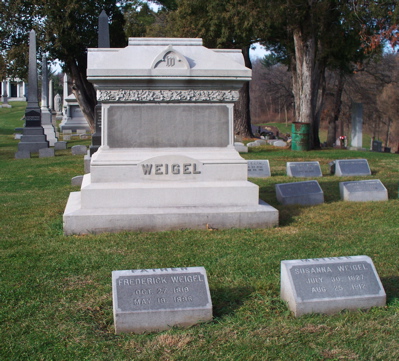Encyclopedia Dubuque
"Encyclopedia Dubuque is the online authority for all things Dubuque, written by the people who know the city best.”
Marshall Cohen—researcher and producer, CNN
Affiliated with the Local History Network of the State Historical Society of Iowa, and the Iowa Museum Association.
WEIGEL, Frederick
WEIGEL, Frederick. (Wittenburg, Germany, Oct. 28, 1819--Dubuque, IA, May 19, 1896). Capitalist. One of Dubuque's earliest settlers, Weigel came here with his parents in June 1833. They built a log house and farmed on what is now the land lying between Main and Iowa and Sixth and Seventh STREETS. Later they moved to a farm at Bloody Run believing it would become the center of the village of Dubuque.
Weigel married in 1859 and five years later they built their home at 12th and Locust. He entered the butchering business and gradually developed a packing company. He rose to wealth by founding the profitable Key City Flour Mills and running the plant day and night. He later sold the mill and invested in real estate and MEAT PACKING.
Weigel purchased vast amounts of land in the downtown area. Much of this remained in the family for years after his death. His home, an excellent example of ITALIAN VILLA ARCHITECTURE (1192 Locust Street), was furnished during his life with valuable works of art and hand carved furniture including some with inlaid GOLD.
Weigel was elected to the city council twice and nominated for MAYOR. He declined to run for business reasons. In 1920 the Weigel memorial window, "David Set Singers Before the Lord," was dedicated in what became SAINT LUKE'S UNITED METHODIST CHURCH.
---
Source:
"Weigel Family Among the Early Settlers in City of Dubuque," Telegraph Herald, Sept. 19, 1937, p. 6


